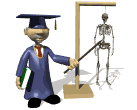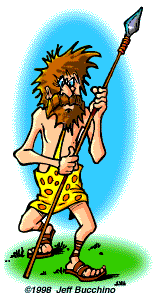
Every noun in French has a gender. Every object and every concept is either masculine or feminine, whether this seems natural and logical un homme et une femme or not un bureau et une table.
Nouns cannot not have a gender. Nor is there a convenient neuter gender for inanimate objects. And you can't figure out the gender of an object by staring at it and deciding "Well, this desk is pretty solid, it seems kind of masculine to me" or "that table over there has a sleek, feminine edge, so it must be la table." (And you can forget Freud too.)
In fact it is not so much the objects or concepts themselves which have genders, but the words which describe them. This object, for example, can be either un vélo or une bicyclette.
This is important to bear in mind because sometimes the gender of a noun just doesn't seem to make sense. Your teacher, for example, is le professeur, whichever of the two following pictures they resemble most.
 |
 |
A person is always UNE personne, whether they are a man or a woman.
 |
